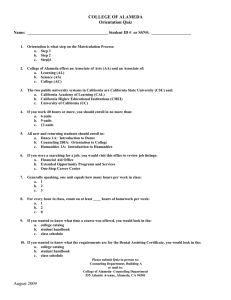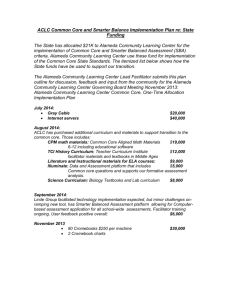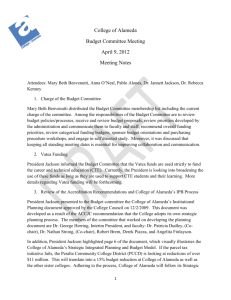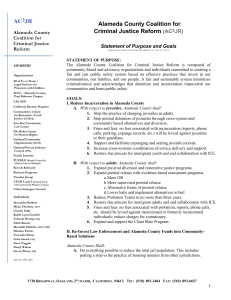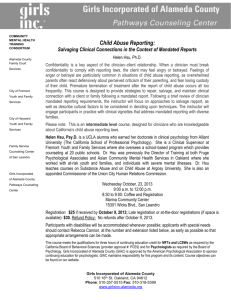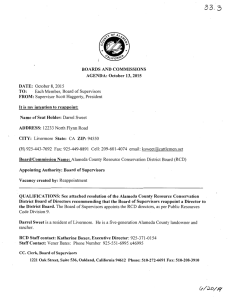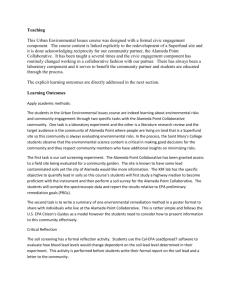without audio - College of Alameda
advertisement
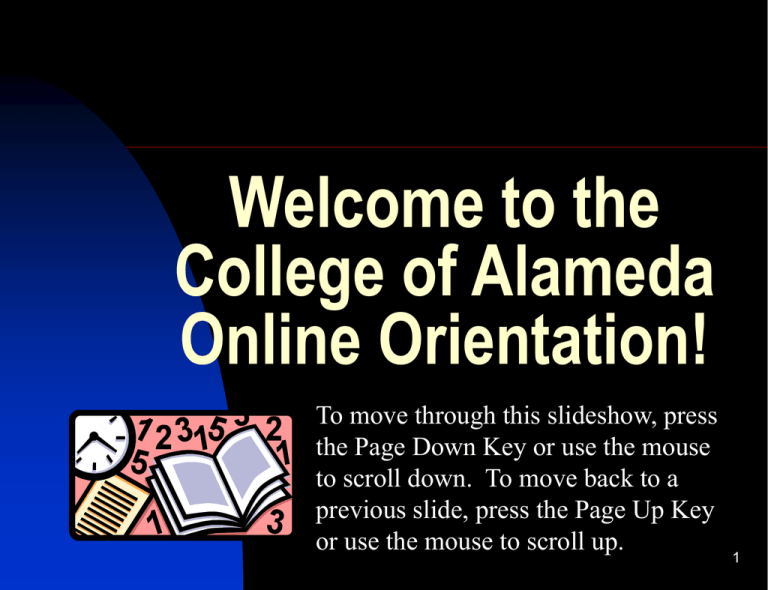
Welcome to the College of Alameda Online Orientation! To move through this slideshow, press the Page Down Key or use the mouse to scroll down. To move back to a previous slide, press the Page Up Key or use the mouse to scroll up. 1 This orientation is designed to: help you get started at the College of Alameda provide direction and information that will be helpful to you as a new student prepare you for course selection and the registration process 2 Congratulations! You’re at Step 3 of the Matriculation Process! What is Matriculation? Matriculation is a state-mandated process to assist you in planning, choosing, and achieving your educational goals. Simply, it is an agreement between the College of Alameda and you, the student, to work toward your success. 3 MATRICULATION STEPS *YOUR PASSPORT TO SUCCESS* 1. ADMISSIONS Complete an application and keep information updated during subsequent enrollment periods. 2. ASSESSMENT COA uses multiple measures to make assessments related to academic readiness and proper course selections. Effective predictors of student success will be your assessment scores, highschool GPA, your study habits, work and family obligations, your level of motivation and other variables discussed during counseling. 3. ORIENTATION All new students participate in orientation designed to provide you with information you need to know regarding services for students, transfer and degree requirements and programs, college rules and regulations, course selection, and registration procedures. 4. COUNSELING All new and returning students are expected to see a COA counselor during the enrollment process to discuss their educational goals, assistance in appropriate course selection, and service referrals. 5. FOLLOW-UP All students are expected to work with a counselor to develop a current personalized STUDENT EDUCATIONAL PLAN that outlines your educational goals and the course sequencing plan to meet those goals. You should meet with your counselor on a regular basis to monitor your progress and 4 keep your ed plan current. What educational opportunities are available at College of Alameda? 5 College of Alameda offers the following: Certificate Programs Associate Degrees Transfer to a 4 year University/College 6 What are Certificate Programs? Certificates can prepare you for an entry level position in a variety of fields including: auto technology, auto body, computer information systems, accounting...and many more! In a certificate program you only study courses related to the field you are interested in. Most certificates can be completed in one and a half years or less. How quickly you move through a certificate program is determined by you and your availability to take classes. Certificate programs focus on preparing you for a specific occupational goal. Generally, certificate programs prepare students for employment in technical fields. 7 Associate Degrees The degree offered by College of Alameda is the Associate of Arts (AA) or Associate of Science degree (AS). Known as “the two year” degree, how long it takes you to complete the associate degree requirements will be determined by where you begin in the Math and English/ESL sequences and your availability to take courses. Most students complete their degrees in three to four years because they have job or family commitments that compete for their time. 8 Associate Degrees In recent years the value of an associate degree has increased significantly. In some professions it can be mean a significant difference in salary and opportunities for advancement. What is required for an AA/AS Degree? 60 units of degree applicable course work General Education requirements Major requirements Elective courses GPA requirements (overall, general education, and in major) 9 Transfer Opportunities A community college such as College of Alameda is an extension of the university system. Public Universities California State University (CSU) University of California (UC) Examples: UC Berkeley, UC Davis, UC Los Angeles Private Colleges/Universities Examples: CSU East Bay, San Francisco State, San Jose State Examples: Stanford, Holy Names, St. Mary’s Tips for transferring Meet with a counselor to discuss your transfer goals and to create an Education Plan. Visit the Transfer Center for information on transfer applications, deadlines, and to meet with Admission Representatives. 10 Student Success DO YOU WANT TO BE AN ACADEMIC SUCCESS? WHAT MAKES A STUDENT SUCCESSFUL? 11 College: New Expectations College is NOT like being in High School You are responsible for the following: Attending class all the time and being on time Making sure you purchase books for your courses Completing assignments on time Conducting yourself respectfully and treating others respectfully, in and out of the classroom Asking questions when you don’t understand or need further assistance Knowing your rights and responsibilities as a college student 12 10 Tips for Success 1. 2. 3. 4. Assess your priorities Get print-out of your schedule Know important deadlines Make a scheduled appointment to see a counselor to do an educational plan 5. Take advantage of resources and services 6. Get to know your instructors 7. Monitor your progress during the semester 8. Interact with classmates, form study groups 9. Get involved on campus 10. Get a printout of your grades once semester ends 13 Student Success Time-management The choices about how you spend your time are important How can you plan your schedule and manage your time? Ask yourself the following questions: 14 Time Management 1. How many hours a week will you be working? 2. How many units do you plan on enrolling? 3. How many hours a week do you plan on studying? 4. What other priorities take up time in your schedule? 15 Time Management IF YOU WORK 40 hours/wk 30 hours/wk 20 hours/wk 5-15 hours/wk TAKE NO MORE THAN 6 units 9 units 12 units 14-16 units 1 unit equals one hour in class or lab a week For every 1 unit of class, plan on studying 2-3 hours for that class 12 units is considered “full-time” enrollment 16 Tools for Success CATALOG includes a complete list and description of all courses offered at College of Alameda lists all college policies and procedures, requirements, and information about degrees, certificates, transfer requirements, credit by examination, academic renewal, probation, course repetition, etc. 17 Tools for Success SCHEDULE OF CLASSES lists the classes that will be offered during the term and includes specific scheduling information such as meeting dates, times, locations, and instructor names. STUDENT HANDBOOK Provides information on resources, policies, and services as well as a calendar for scheduling. 18 Courses that help students succeed at College of Alameda Coun 200A: Orientation to College (0.5 units) Coun 24: College Success (3 units) All new or returning students should enroll in this course to help you transition to college Learn skills that help you succeed academically: time-management, critical thinking, goal setting Coun 57: Career/Life-Planning (3 units) Not sure of your career or major? Take this course to help you explore your options and discover how to match your values and skills with a career or major 19 Student Support Services Financial Aid Extended Opportunity, Programs and Services (EOPS) Offers aid to educationally under-prepared and/or economically disadvantaged students Disabled Students Programs and Services (DSPS) Offers financial assistance like grants, loans, and other aid to eligible students Offers instruction and support services to students with disabilities One-Stop Career Center Provides job search assistance, job listings, career and vocational guidance 20 Orientation Completed! Congratulations! This completes the online orientation. Please print out the ORIENTATION QUIZ and submit it to the Counseling Department in the A Building If you have any questions, please contact the Counseling Department at (510) 748-2209 or stop by the A Building in Student Services 21
